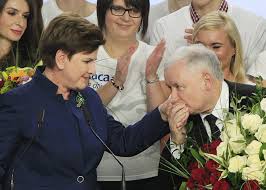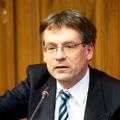Iwona Barwicka-Tylek
Jagiellonian University, Faculty of Law and Administration, Faculty Member

Summing up many comments on the results of Polish parliamentary election one might learn that Poland has replaced the ruling 'pro-European, centrist, liberal' Civic Platform (PO in Polish) that has governed for eight years with the opposition 'right-wing, Eurosceptic, xenophobic, pro-Catholic, nationalist and populist' Law and Justice party (PiS) of Jarosław Kaczyński. Enough to get frightened wondering what those Poles are up to. Do they really want to quit Europe, shut borders and create a religious state? Now, when Europe is confronted with problems that require cooperation and solidarity of all civilised countries?
'No' is the shortest answer. The victory of PiS does not make us Poles neither more religious, nor more xenophobic. On the contrary, it simply means that there is something more in PiS than this xenophobic and Catholic core. Of course this victory reflects a growing distrust towards EU institutions. Still, to see that the EU is in crisis, one does not need PiS.

Beata Szydło? She was put forward by Kaczyński
source: AP
The fact that PiS would win the election was obvious long ago. No surprise. The surprise would have been if PO had done this. Third term in power? Even with greater achievements and fewer mistakes it would be hardly possible. Still, not many expected that PiS would get enough votes to rule on its own (235 seats out of total 460 in the lower chamber of the parliament). That is a great success, no doubt, even if it is worth to remember that formally under the label PiS we have a coalition of the 'United Right', and not only the party of Kaczyński. There are also two other right-wing parties. Small, but with ambitious and well-known leaders: Jarosław Gowin and Zbigniew Ziobro (the ex-member of PiS and the former Minister of Justice in its government). Both got departments in the new government of Beata Szydło (respectively: the Ministry of Science and Higher Education and the Ministry of Justice again).
Looking at the new government (still a proposal) it is easy to see that it consists of two totally different factions. The first group is Kaczyński's 'old guard' who took over foreign affairs, justice, national security (with the most controversial Antoni Macierewicz, known for his conspiracy theories on the Smoleńsk plane crash in 2010), and internal security agencies. The second group is definitely less colourful and has no political background – both features are for Kaczyński virtues in themselves – but what is more important, it has something that PiS needs, namely wide professional esteem outside politics. Members of this group are to start with translating at least some of hallow sounding electoral promises into the language of economy and social policy. Their expert knowledge is a warrant that it will be done cautiously enough to avoid destabilisation and a happy-go-lucky spending policy. The task is demanding, but not unrealistic. PiS has already proved more than once that in spite of its visible social bent (helping 'ordinary' people, who happen to be, as usual, not so rich in their majority) it is not afraid of the free market economy and liberal moves. It is significant that a new ministry, or even a super-ministry, the Ministry of Development has just been established.
What about Beata Szydło? The Prime Minister seems to stand in beetwen. She was put forward by Kaczyński, but she rather belongs to the second group (if PR skills can be taken for an expertise – Szydło came out of the shadow as the head of Duda's presidential campaign this spring). All that makes her position difficult, and that is just a sign of the main paradox of it all. The party's great electoral success is to a large extent due to the new, young PiS and in particular, to names like Szydło and the President Andrzej Duda. Nevertheless, that 'young PiS' still means nothing without Kaczyński, as it cannot compete with his holistic and coherent political vision that makes PiS the PiS. Szydło and Duda are far more trusted than Kaczyński in every public opinion poll. Well, let it be. However, they have no energy of their own – they reflect light from the good old traditional PiS. We may not see the sun while the moon is shining, but that does not make the moon self-sufficient. And probably nothing will change soon in this respect. Given the above, it looks like PiS, having the monopoly of power, introduces a division of labour. The expert part of the government is to work hard to produce changes that would earn positive response from the society and thus strengthen the image of the party as a courageous but not too adventurous reformer. Here a large dose of continuity is expected that would balance the declared radicalism of ideas like lowering the retirement age, paying financial bonuses for those having children or tightening tax collection. If it works, good. If not – Szydło is the one to bear responsibility for the eventual failure.
It would be a premature conclusion to suggest that Kaczyński simply wants to avoid accountability and that is why he prefers to be a back-seat driver. There are reasons to believe that he is simply not interested in all that burden of day-to-day governing as long as it runs smoothly and facilitates achieving more important goals. Here I allow myself some speculation. It looks like the big plan has not changed a bit for years. Kaczyński's dream is to be acknowledged as the one who burried post-communism (since he was not among those who fought communism). This means two things for him. First: judging and getting rid of communist remnants hidden within the institutional framework of the country (habits, norms, but people perhaps as well). Second: overcoming the inferiority complex toward the West, which is more proudly labelled as 'regaining national sovereignty'. After the fall of communism it seemed natural to take the path of liberalism, so we put our trust in imitating the West. Not without success, but not without painful disappointments. Kaczyński exposes the latter to show that the choice our elites made was politically naive and in fact against Polish interests. In short, according to him almost all political parties are in fact guilty of surrendering Poland to foreign domination (both in the economic and the cultural sense). No big difference between communists, post-communists, and Civic Platform though.
For a Western ear such opinions sound populist and nationalist. The critics of PiS in Poland tend to view it similarly, accusing Kaczyński of silly and unjust ideological resentment. They add to it that apparently Kaczyński has not learnt anything and he repeats old mistakes which made his 2005 government collapse after only two years in power. Perhaps, perhaps, perhaps. Nevertheless, we should not forget that the situation has changed and so have European societies. No longer is it useful to look at the insurgence of right-wing parties and nationalism through the prism of the 20th century ideological wars. The ideological message of PiS is perceived (especially by the youth) as a promise of reviving the sense of community to make life better for those who belong to this community. We still love the West, to be sure, but it is not a romantic feeling any more, that would make us embrace everything capitalism has to offer. By the way, do other Europeans and Americans love it more? Scepticism is not necessarily a proof of growing nationalist obsession and xenophobia – rather, it is first of all a symptom of deep cultural change. Among other issues, this change questions the concept of Western-type liberal democracy. No wonder many politicians sense the potential of such distrust and try to take advantage of it. That is exactly how democracy should work. Worse thing is that in some cases the political imagination of such politicians does not go beyond promoting a kind of 'illiberal democracy'. Unfortunately Kaczyński and his most devoted friends seem to be unaware of dangers connected with the latter, which may be worrying (this side remark is not too convincing without further explanations, but to give it some meaning it is enough to read articles of Fareed Zakaria who coined the term).
In fact, the recent Polish election was won first of all by the call for change, which is the best (even if quite annoying) test for democracy. This call introduced into the parliament two new, few-months old groups: the Kukiz'15 (Paweł Kukiz is a pop musician and was a kind of a new born star of the Presidential election) and Ryszard Pettru's Modern Poland. The first group is a colourful but quite inconsistent gathering that wants to 'democratize democracy' and to 'destroy the System'. Sounds vague, but yes, we Poles are still romantic and that urges us to support the weak and the rebellious... Given the fact that among Kukiz' allies there are at least a few right-wing people, that is where the political support for PiS may come from, if needed. The same call for novelty dismissed many 'permanent' politicians. The United Left did not pass the 8% electoral threshold. At the same time, the politically 'old' party, PSL (Polish People's Party) got only 16 seats. It is really a kind of personal tsunami. So far PiS, thanks to its being a peculiar political 'outsider-in-politics', may satisfy the general need for new ideas to take charge. Still, one cannot taste ideas to check how good they feel – they have to bear fruit first. Since PiS has it all, that is the President and the majority in both chambers of the parliament, we have the right to expect a busy winter in Polish politics. Poles have many virtues, but patience, alas, is not one of them.



